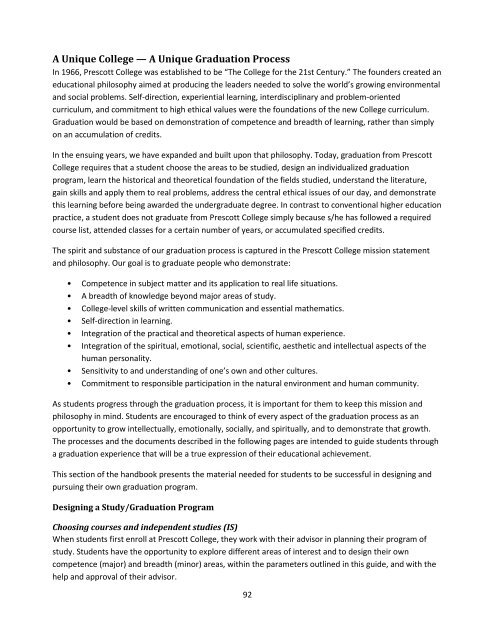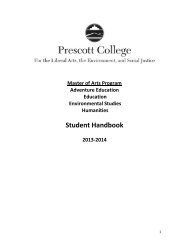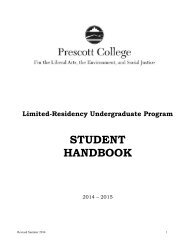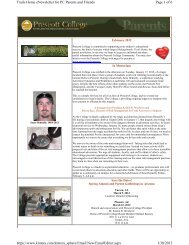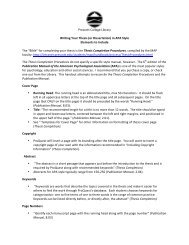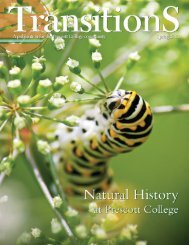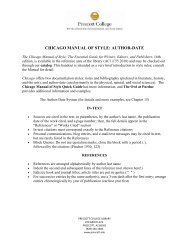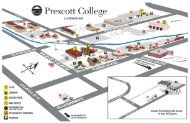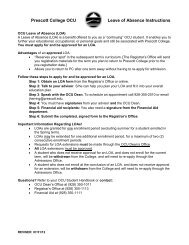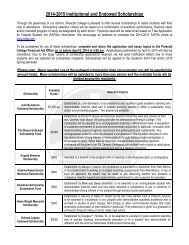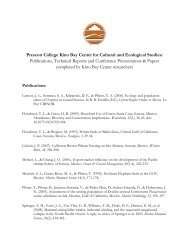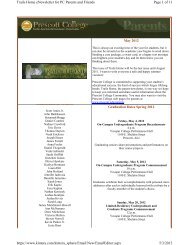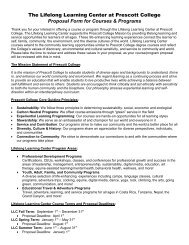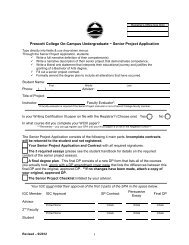On-Campus Undergraduate Student Handbook - Prescott College
On-Campus Undergraduate Student Handbook - Prescott College
On-Campus Undergraduate Student Handbook - Prescott College
- No tags were found...
You also want an ePaper? Increase the reach of your titles
YUMPU automatically turns print PDFs into web optimized ePapers that Google loves.
A Unique <strong>College</strong> — A Unique Graduation ProcessIn 1966, <strong>Prescott</strong> <strong>College</strong> was established to be “The <strong>College</strong> for the 21st Century.” The founders created aneducational philosophy aimed at producing the leaders needed to solve the world’s growing environmentaland social problems. Self-direction, experiential learning, interdisciplinary and problem-orientedcurriculum, and commitment to high ethical values were the foundations of the new <strong>College</strong> curriculum.Graduation would be based on demonstration of competence and breadth of learning, rather than simplyon an accumulation of credits.In the ensuing years, we have expanded and built upon that philosophy. Today, graduation from <strong>Prescott</strong><strong>College</strong> requires that a student choose the areas to be studied, design an individualized graduationprogram, learn the historical and theoretical foundation of the fields studied, understand the literature,gain skills and apply them to real problems, address the central ethical issues of our day, and demonstratethis learning before being awarded the undergraduate degree. In contrast to conventional higher educationpractice, a student does not graduate from <strong>Prescott</strong> <strong>College</strong> simply because s/he has followed a requiredcourse list, attended classes for a certain number of years, or accumulated specified credits.The spirit and substance of our graduation process is captured in the <strong>Prescott</strong> <strong>College</strong> mission statementand philosophy. Our goal is to graduate people who demonstrate:• Competence in subject matter and its application to real life situations.• A breadth of knowledge beyond major areas of study.• <strong>College</strong>-level skills of written communication and essential mathematics.• Self-direction in learning.• Integration of the practical and theoretical aspects of human experience.• Integration of the spiritual, emotional, social, scientific, aesthetic and intellectual aspects of thehuman personality.• Sensitivity to and understanding of one’s own and other cultures.• Commitment to responsible participation in the natural environment and human community.As students progress through the graduation process, it is important for them to keep this mission andphilosophy in mind. <strong>Student</strong>s are encouraged to think of every aspect of the graduation process as anopportunity to grow intellectually, emotionally, socially, and spiritually, and to demonstrate that growth.The processes and the documents described in the following pages are intended to guide students througha graduation experience that will be a true expression of their educational achievement.This section of the handbook presents the material needed for students to be successful in designing andpursuing their own graduation program.Designing a Study/Graduation ProgramChoosing courses and independent studies (IS)When students first enroll at <strong>Prescott</strong> <strong>College</strong>, they work with their advisor in planning their program ofstudy. <strong>Student</strong>s have the opportunity to explore different areas of interest and to design their owncompetence (major) and breadth (minor) areas, within the parameters outlined in this guide, and with thehelp and approval of their advisor.92


